Waylon Jennings - Honky Tonk Heroes
Listen to full episode:
On this episode, we discuss Waylon Jennings' 1973 landmark LP: Honky Tonk Heroes. While it may be up to debate as to which album marked the beginning of "Outlaw Country," there is little doubt as to the impact Waylon Jennings and Honky Tonk Heroes had on the burgeoning movement and country music in general.
Jennings' groundbreaking LP stripped away the strings and lush vocals dominant in Nashville at the time, and instead presented hard-edged honky tonk music, with attitude to spare. Jennings also found a willing partner in crime in the little-known at the time Texas songwriter, Billie Joe Shaver, whose songs spoke of both the freedom and the consequences of living hard. Their partnership created a genre-defining album that changed country music and influenced a whole group of musicians that followed.
THINGS WE DISCUSSED ON THIS EPISODE
Waylon started working a a disk jockey at age 12 and he continue to do so at various radio stations accross west Texas and Arizona.
Here he is spining records at KCKY in Pinal County, Arizona.
Listen to an 18 year old Waylon Jennings perform “Slippn' and Slidin’,” a song written by Little Richard . Little Richard was a huge influence on Jennings.
At the time, Jennings hosted a radio show on KZZN, a radio station on his home town of Littlefield, Texas. He dedicates the song to his future first wife, Maxine Lawrence.
Buddy Holly asked his friend, Waylon Jennings to leave the disk jockeying behind to play bass with him on the Winter Dance Party tour, a 24 day tour barnstorming the Midwest.
These photos were taken in a photo booth in Grand Central Station just prior to the tour. Yes, that is Buddy Holly giving Waylon “the Bird” in the bottom photo.
The day the music died.
KRIB was a radio station sponsor of the Winter Dance Party show in February 1959 at the Surf Ballroom in Clear Lake, Iowa, where Waylon Jennings (pictured left) played bass with Buddy Holly. Holly, along with Ritchie Valens and the Big Bopper died in a plane crash later that night.
The tour continued after the tragedy for two more weeks due to pressure form the tour promoters, with Jennings taking Holly's place as lead singer.
Waylon Jennings RCA Publicity photo from 1965
Jennings was signed to RCA at the suggestion of Bobby Bare, who called Chet Atkins, head of the RCA Victor studios in Nashville after hearing Jennings on the radio while he was passing through Phoenix, AZ. Jennings asked his friend (and RCA artist) Willie Nelson if he should relocate to Nashville. Nelson told him he should stay put. Jennings ignored his advice.
Here’s the poster for Willie Nelson’s Dripping Springs Reunion.
It was at this event that Waylon Jennings first met Billy Joe Shaver and heard him perform “Willie the Wandering Gypsy and Me.” The story goes (depending on who tells it) that on that strength of that song alone, Jennings promised Shaver that he would record a whole LP of his songs.
Side note: the event was impetus the for future Willie Nelson 4th of July Picnics.
Kris Kristofferson, Willie Nelson, and Waylon Jennings hanging out back stage at the Dripping Springs Reunion.
Billy Joe Shaver and Waylon. Jennings.
Watch Waylon Jennings perform “Honky Tonk Heroes” on Don Kirshner’s Rock Concert from October of 1974 . The show syndicated during the 1970s and 80s. Also appearing on this episode were the Rolling Stones and Kool and the Gang.








